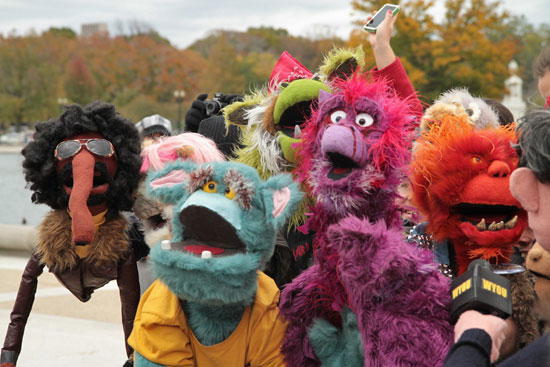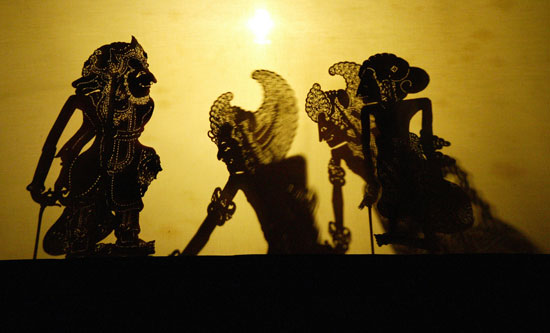Puppets come out to play in L.A.
April 4, 2013

The "Million Puppet March" in Washington had a goal of saving PBS funding. Only fun is on the agenda for L.A. Puppet Fest.
Stretching their wooden arms, the sleeping puppets of Los Angeles are ready to take center stage.
The puppetry community is full of characters—and not just the wooden or fuzzy varieties. From old-school marionettists to modern dramatists who manipulate 10-foot monstrosities in teams of three, they’re as diverse as the city they live in.
Last September, Joe Smoke of the City of Los Angeles Department of Cultural Affairs approached Maria Bodmann, an expert in the thousand-year-old art of Balinese shadow puppetry. Together, they pulled a few strings and organized a meeting of L.A. puppeteers with the goal of producing a citywide festival. This month, their plans will come to life at the inaugural L.A. Puppet Fest.
Bodmann hopes the festival will expose people to the many varieties of puppetry.
“People think fuzzy things with eyeballs, but that’s just one little bit of puppetry,” Bodmann said. “There are other types that address issues that aren’t really for kids. The stuff I do is connected to religious rituals. I can’t really do it for birthday parties.”
Pre-festival activities have already begun. From Thursday through Saturday, Rogue Theaters presents “Songs of Bilitis,” a mature audiences-only puppet rendition of the French erotic novel by Pierre Louÿs. The official opening takes place Sunday, April 7, at the Skirball Cultural Center and will feature puppet-making, performances and storytelling. After that, there will be performances by the Bob Baker Marionette Theater, a lecture on puppet history and puppet films and classes. The festival wraps up on April 28 with “L.A.’s largest-ever puppet parade” and closing ceremony at the Third Street Promenade in Santa Monica. See the website for a full schedule of events.
Michael Earl, a co-founder of the Puppet School who had a turn playing “Mr. Snuffleupagus” on Sesame Street a few decades back, said professional puppeteers have been through tough times in recent years.
“When Jim Henson was alive, there was a lot of puppetry happening; they had to train more puppeteers because there were not enough,” Earl said. “Then, 3D animation was invented and it slowly started to replace puppetry jobs.”
But Earl and his contemporaries see puppets making a comeback, due partly to the success of live stage productions like The Lion King and popular box office offerings including Where the Wild Things Are and 2011’s The Muppets.
Cue the L.A. Puppet Fest, which is being called L.A.’s first-ever citywide puppet festival—a description reached amid controversy.
“There is inter-puppet genre conflict,” said Michael Bellavia, who is organizing the puppet parade and closing ceremony. “The puppet geeks, they got all up in arms when this was billed as the first puppet festival.”
Accounts vary. Some point out smaller-scale annual events by the Los Angeles Guild of Puppetry. Alan Cook, co-founder of the guild and curator of the International Puppetry Museum in Pasadena, is a revered patriarch of the puppetry community. He recalls a major, national festival held at UCLA back in 1957. Recorded puppet history in Los Angeles dates back at least 100 years, he said. Worldwide, forms of puppetry go back millennia and represent some of the most respected cultural art forms.
The guild’s current president, Christine Papalexis, said contention among puppeteers is common because they’re artists.
Despite their differences on the minutiae, everyone agrees the festival should be as inclusive as possible. They’re united by a love of puppetry that, for many, began with their first toy puppet in early childhood.
That inclusivity extends to the audience, who will be invited to make their own puppets and learn puppetry skills at some of the events. The L.A. Puppet Fest Parade, for example, will have a puppet-making station on site, and organizers say it’s fine if people just want to draw eyes and a mouth on their hands.

Carved rawhide shadow puppets act out a scene involving the heroic Pandawa brothers of the Mahabharata, a Sanskrit epic from ancient India.
Posted 4/4/13














 405 bridge work causes a stink
405 bridge work causes a stink